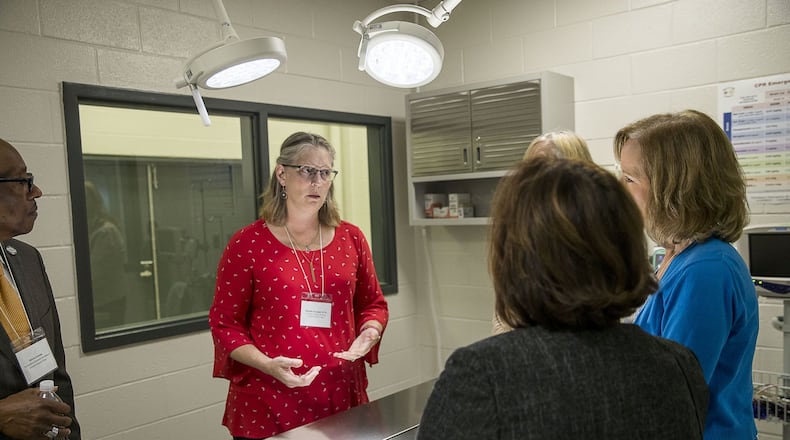Any kid who has wrapped gauze bandages around a puppy’s paw pretending to fix a “boo-boo” has probably envisioned one day becoming a veterinarian. Those who stick with that dream quickly realize that veterinary science is an in-demand field that goes well beyond treating house pets.
In Gwinnett County, many of those students are enrolled in the Grayson Technical Education Program at Grayson High School. Open to juniors and seniors from any Gwinnett County high school (including the Online Campus), students spend their afternoons pursuing academic credit toward a career. To expand the opportunities, the school recently unveiled a new surgical suite — the first of it’s kind in Georgia. It has also extended a partnership between its veterinary science program and the veterinary technology program at Gwinnett Technical College.
”We made changes to resemble a modern-day facility,” said Jennifer Allen, a registered veterinary technician and Grayson Tech instructor. “This allows the students to assist in a true vet surgery.”
Related story: New $38 million school to focus on health care
Related story: Maxwell High receives donation for fire services program
Related story: Career pathway pays off for Gwinnett senior
The surgery suite has been two years in the making, said Dr. Ryan Cheek, program director for veterinary technology at Gwinnett Technical College.
“It was important to the advisory committee to work through the obstacles to make this happen.”
The facility will be the location for elective procedures such as spaying and neutering. The Gwinnett County Animal Shelter will supply the patients which, once they recover, will be available for adoption.
Although the facility is at Grayson Tech, the college students will perform the procedures with high school students observing and practicing skills such as venipuncture (phlebotomy), catheter placement, surgical prep and recovery procedures.
The high school students will also shadow the Gwinnett Tech students learning the curriculum and assisting.
“They learn soft skills like records keeping, taking vital signs and specimen collection,” said Allen.
This allows the Grayson Tech students an opportunity to get a jump on things they’ll need to know for their 15-week internships at partner facilities. Those are the same skills required for graduation and a state license.
And even though they all need the same basics, there are myriad possibilities for specialization.
“There is a high demand for veterinary medicine and it goes well beyond the typical small-animal vet,” said Allen.
Seniors Corinne Bluhm, Haley Johnson and Laila Rawles all nodded in agreement.
“Think about it, any place that uses animals needs someone to care for them,” said Bluhm, who is interested in working with research animals.
Johnson wants to go all the way to become a doctor of veterinary medicine, and Rawles has her sights on becoming an agricultural veterinarian. She said she’s not squeamish about working around large animals like cows and horses.
“We eat after the animals,” she said. “We have to make sure that they are healthy or it can affect us.”
Allen envisions a day when more people understand the necessity of all types of veterinary medical personnel.
“There’s a movement to establish veterinary nurses,” she said. “The industry for all types of animal care is growing rapidly and we’re working to keep pace and make sure our students understand their career options.”
Georgia Veterinary Science programs
Doctor of Veterinary Medicine
University of Georgia
Registered Veterinary Technician
Athens Technical College
Fort Valley State University
Gwinnett Technical College
Ogeechee Technical College
Bachelors of Animal Science
University of Georgia
Berry College
Fort Valley State University
Abraham Baldwin Agricultural College
Source: Grayson Technical Education Program at Grayson High School
Top areas for veterinarians by average salary
The average salary for a veterinarian in metro Atlanta is $96,490, which doesn’t even crack the top 10. Here are the top five metro areas for veterinarians by salary.
Lubbock, Texas — $228,450
Denison, Texas — $213,260
Naples, Fla. — $161, 280
El Paso, Texas — $159,930
Riverside, Calif. — $151,350
Source: Bureau of Labor Statistics
Metro areas with most demand for veterinarians
New York City
Los Angeles
Washington, D.C.
Chicago
Atlanta
Source: Bureau of Labor Statistics
About the Author
The Latest
Featured


